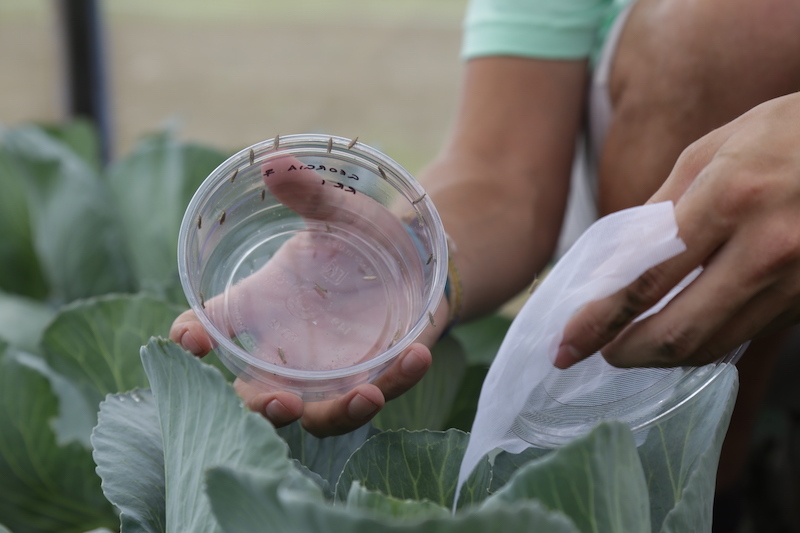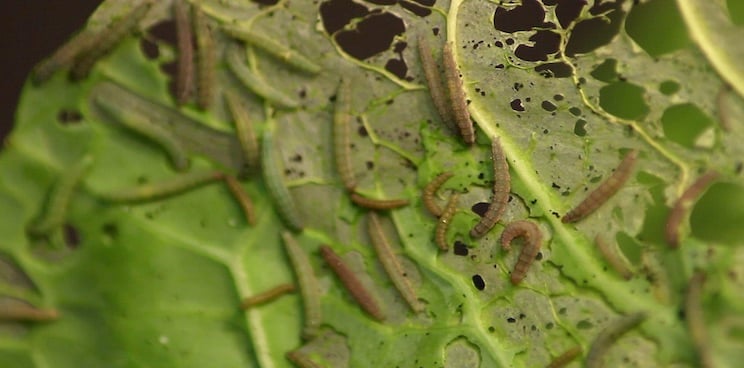A study led by Oxitec has shown for the first time that diamondback moths genetically engineered to produce only male offspring can survive in the wild, a solution that shows promise for cutting populations of the crop pest.
Caterpillars of the diamondback moth Plutella xylostella are one of the most destructive pests for growers of cabbages, broccoli and cauliflowers. Rising resistance to insecticides is making it progressively more difficult for farmers to deal with the insects effectively.
In a study published in Frontiers in Bioengineering and Biotechnology, a research group led by employees of the UK company Oxitec has completed the first field trial of a solution to this crisis: male diamondback moths that are genetically engineered to only produce male offspring. This modification reduces the population of the pests, and also means that the strain is lost from the population over time as a self-limiting mechanism. According to the study results, the engineered males dispersed at a similar rate in the field to their wild-type counterparts.
According to Neil Morrison, Oxitec’s Head of Agriculture Programs, this is a vital study for the project, as an open field environment has a lot more challenges for engineered insects than the lab.
“Weather can be inhospitable, insect predators are widespread, and moths need to travel further to seek shelter or find mates,” Morrison told me. “This field study offers insight into how these moths will perform when they are used to protect farmers’ crops, and they performed well.”

In collaboration with scientists at Cornell University, US, Oxitec found that the genetically engineered males were able to grow normally and to successfully compete for females in separate lab experiments. The results support the potential of this strain for use in crop protection, and Oxitec plans to progress the project to larger field trials.
Oxitec is owned by the US company Intrexon. It has other crop protection programs in development, including genetically modified strains of fall armyworm and the soybean looper moth. However, the company is best known for its work with controlling populations of disease-carrying mosquitoes.
The company has carried out several field trials of its first-generation modified mosquito strains in Brazil, Panama and the Cayman Islands. However, the non-profit organization GeneWatch UK, which claims to “monitor developments in genetic technologies from a public interest, human rights, environmental protection and animal welfare perspective,” wrote in a 2018 report that it was not convinced of the efficacy of Oxitec’s technology.
When asked to comment on the 2018 report, Morrison disputed its veracity. “It ignores the body of strong science, detailed in more than 100 peer-reviewed publications carried out by scientists and scientific institutions from around the world, upon which our public health and crop protection solutions are built. As such, it has no place in reasoned scientific discourse as it was created to drum up negative, sensationalist headlines.”
In an additional headache for Oxitec, a media scare erupted in 2019 when a paper published in Scientific Reports questioned the idea that the Oxitec mosquito strain was truly self-limiting, though later this paper was itself disputed. The editors of the journal published a note on the paper in September 2019 to state that criticisms of the paper were being investigated and that a “further editorial response will follow the resolution of these issues.”
“The [2019] paper’s authors made speculative statements and selectively ignored the body of critical peer-reviewed evidence, including their own, describing safety and effectiveness of technology,” Morrison said.
Oxitec has recently launched a second-generation genetic engineering approach that lets the mosquito strain last for longer in the wild, and also makes the pests more susceptible to insecticides.
Images from Oxitec and Cornell Alliance for Science





